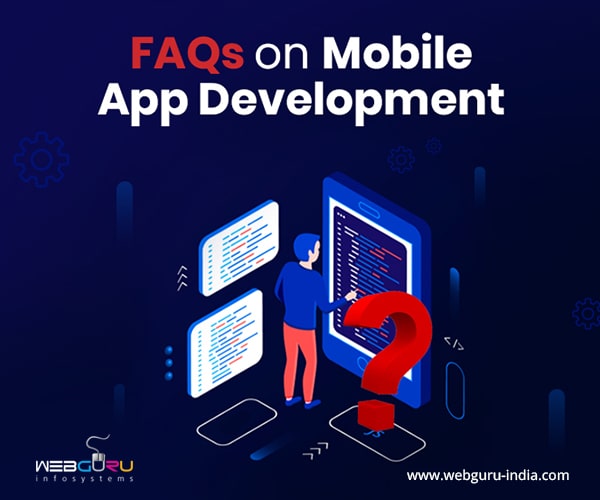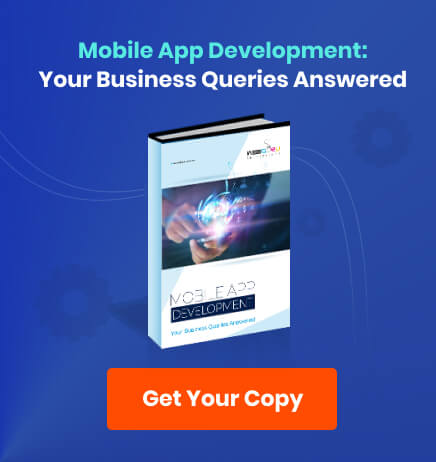Home Blog Mobile App Development FAQs on Mobile App Development
FAQs on Mobile App Development
- 30 Dec / 2022
- 2,675 views
- 8 Min Read

A mobile app certainly has the potential to take your business to the next level. However, it can also be expensive as well as time-consuming. It requires further marketing and promotions to actually succeed. Naturally, you may have several questions regarding mobile app development before committing to such an investment. So, we have compiled a list of frequently asked questions that should clear most of your doubts and let you make the decision wisely.
Mobile App Development FAQs
Here are the top 18 questions on mobile app development and their answers.
1. What are the different kinds of mobile apps?
There are a few categories you distinguish apps into:
- Social Media Apps – Used to connect with people on social networks, like Facebook, Instagram, and Twitter.
- Utility Apps – Used regularly for a variety of reasons, like calculators, weather apps, and reminders.
- Lifestyle Apps – Used for a variety of niches based on people’s preferences, such as Spotify, Apple Music, TripAdvisor, and Uber.
- Gaming & Entertainment Apps – Primarily for video games that people can play for long hours, like Angry Birds and Clash of Clans.
- News Apps – Used to supply regular news and information users, like Buzzfeed, Flipboard, and Feedly.
- Productivity Apps – Used to help people accomplish their tasks efficiently and quickly, like Evernote and Google Docs.
- eCommerce Apps – Used to purchase goods or services, both on B2B as well as B2C models, like Amazon, Etsy, etc.
2. Will the idea work?
The only solution to this issue is to put the concept to the test with genuine prospects. You must take your idea, develop a working prototype, and then make it available to the public to see if it is something that interests them.
There’s no way to determine if your idea will work unless you take it to prospects or at least look at how apps similar to yours have done in the market.
3. Who will use the app?
Before everything else, you must know who the users of your app will be. Detailed research of user demographics is what will help in this regard. Concentrate your research on learning about your end users’ ages, purchasing habits, the area they live in, the issues they face, the time spent on their phones, and their security preferences, among other things. If your app appeals to a niche market, then make sure you know exactly whom that market is comprised of.
4. What will the competition be like?
Competition is crucial not only in the app development process, but also in determining the future of an application. The first stage in competition analysis is to determine whether similar apps to yours exist in app stores.
Collecting this information will assist you to find answers to not only the queries linked to everything your app should feature but will also provide you insights regarding what is effective for your competition and what isn’t.
5. What programming language works best for app development?
The best language for any app will essentially depend on what functionalities are expected of it. Your budget too can determine the kind of development framework being used. Needs and requirements keep changing, and what is popular today may not be so in 5 years’ time. However, some of the most widely used and in-demand programming languages and frameworks today for mobile app development are JavaScript, Objective C, C#, Swift, Java, Kotlin, and Dart.
6. How long will the development process be?
Depending on the sophistication of the app, you should have a general sense of how long the app should take to develop. While it normally takes 6 to 7 months to complete the development process from conception to launch, some apps can take up to a year or even more. Measure this period against your launch plans, or decide if you’re happy to launch an MVP before the real product.
For further understanding, you may read our blog on Technical Insights Into The Mobile App Development Process.
7. How much does it cost to build an app?
The cost of app development, like time, is totally determined by the number of functions you intend to include. Getting pricing quotes from various app development companies will help you build and fix a budget. When hiring developers, make sure you ask them what functions incur what kind of costs. This can help you create a rough budget. Here are the things that generally determine the costs:
- Development Framework (Native or Hybrid)
- Design
- Features & Functionalities
- Testing
- Integration with Pre-existing Systems
8. Should I go for a Native or a Hybrid App?
The decision between a native app and a hybrid app depends on factors such as performance, user experience, development time and cost, and maintenance. Native apps are usually faster and offer a better user experience, but are more expensive and time-consuming to develop and maintain. Hybrid apps are cheaper and faster to develop, but may not perform as well and may not offer the same level of user experience. Similarly, Native apps require separate updates for each platform, which can be time-consuming and costly. Hybrid apps, on the other hand, can be updated more easily, as they only require a single codebase.
Ultimately, the best choice will depend on your specific needs and goals. It may be helpful to consult with a developer or development team to determine the best approach for your project. For further insight, you may read our blog on Which Is Better – Native Or Hybrid App Development.
9. What is a Wireframe? Is it necessary to have one before development?
A wireframe version of a mobile app is used to display the elements of the app UI. It is helpful for laying out the structure of your app, the navigation between screens, how its functionalities will work, and how the different elements will work.
Usually, the app developers you hire will create a wireframe themselves and present it to you, so having one created before that isn’t necessary. However, first getting a wireframe version developed might help you understand the UI and features of the app better, and that could make the development significantly streamlined.
10. How will the app help customers?
You must have a clear understanding of how the application you’re about to design will benefit your consumers from the beginning. You need to ensure it adds value to their time. What issue will it resolve for them? And ultimately, how it will be unique from what customers constantly encounter in the app stores.
This is something you must understand when conducting demographic market research. You must be sure of what issues your target users face. Regardless of how original the idea of your app is, you must understand that it will likely flop if it does not provide value to your end consumers.
11. How will it succeed in app stores?
At the end of the day, proper market research and addressing your users’ issues are what will make sure your app doesn’t fail in app stores. That means not only will your app have to be well built, but it will also require constant updates, as users are almost bound to have feedback involving features that are not easy enough to use.
At the same time, there are also a lot of marketing techniques that will make sure your app actually reaches people. App Store Optimization is very important and must be done if you want your app to be visible.
12. How to raise funds for the app?
There are a few ways to generate funds for developing an app, since they can certainly get pricey, especially when being built by an experienced and high-quality team. Two popular means are crowd-funding and approaching venture capitalists. Visiting startup meets can help you get an idea of how competitors are generating funds, and also help you meet potential investors who are willing to make an investment in your app.
13. How to monetize the app?
You can earn money from your app in a variety of ways. You can make it a fully paid app, have premium features, or provide in-app advertisements – there are several app monetization options at your disposal.
Regardless of whichever app monetization approach you choose, the best way to deploy it is by introducing it right from when it is uploaded to the store. Don’t wait for the app’s response before implementing a monetization technique; have it in place from the start.
You may also read our other blog on Strategies To Let Your Mobile App Earn Money.
14. How to keep the app secure?
In an era where our world is full of incidents involving mobile data breaches and security dangers, it is critical that your app is safe from all angles to avoid a future full of hazards and lawsuits. You must also have the solutions to all of your mobile app testing questions.
Your chosen mobile app development company must adhere to the best practices on mobile app security. All you must do is emphasize the importance of a robust security feature inside your app.
15. How to protect the app idea?
If your app becomes a success in app stores, competitors will almost certainly try to build clones, or implement your ideas within their own apps. You may, of course, patent your app idea, but that might not fully work if workarounds can be found.
However, till it is launched, you can have full control over your app ideas. You can sign an NDA with your app developers to prevent your concept from being shared.
At the same time, it is really important to ensure you have intellectual property rights to any image files, music, videos, or animations that you have used in your app. Without complete ownership, you can land up in legal issues, and the NDA might be rendered moot.
16. How to judge the success of the app?
You must decide for yourself what is important to you. It can be the session times, number of downloads, or the money you generate. Once you know how to define success for your app, you can set realistic goals and plan your marketing and promotion accordingly.
17. How can I ensure that my app is future-proof?
To make your app future-proof, consider the following:
- Use a flexible and scalable design
- Use modern technologies
- Follow best practices for security and data privacy
- Use agile development methodologies
- Regularly update and maintain your app
- Stay informed about industry trends
18. How to choose the right app development company?
There are several factors to consider when choosing an app development company for your app:
- Expertise & Experience: Look for a company with a track record of building successful apps and a deep understanding of your industry.
- Technical Capabilities: Consider the company’s technical capabilities and whether they have the skills and resources to build the type of app you need.
- Culture Fit: It’s important to find a company that shares your values and vision for the app. This will help ensure a smooth and successful collaboration.
- Portfolio & References: Review the company’s portfolio and ask for references from past clients to get a sense of their work quality and how they handle client relationships.
- Pricing & Terms: Consider the company’s pricing and terms, and make sure they align with your budget and project goals.
- Communication & Transparency: Choose a company that is transparent and communicates effectively throughout the development process.
Conclusion
This should cover a majority of questions that most clients have. Developing a mobile app is a considerable investment, and you must be thorough in your research before going ahead with it. Your ultimate aim is to make your mobile app successful. If your question isn’t listed here, feel free to contact us and we’ll be happy to clear your doubts.
7 comments
Leave a Reply

-
1000+
Happy
Clients -
25+
Countries
Served -
19+
Years of
Trust









The comprehensive FAQs on mobile app development are an eye-opener of sorts. The information given is topical, elaborate, and precise. Kudos to the writer.
thanks for sharing
Very Informative post. Thank you.
Very informative. It helps in decision making. Thank you.
This is very useful information.
I really love your blog.. Excellent colors & theme.
This blog post is a fantastic resource, packed with valuable tips that are easy to understand and implement.
I truly appreciate the author’s effort in providing such helpful insights. It’s a quick read, but the knowledge gained from it is priceless.